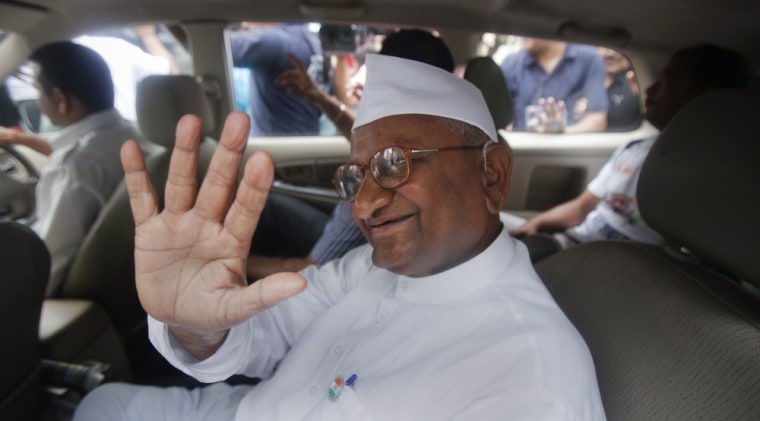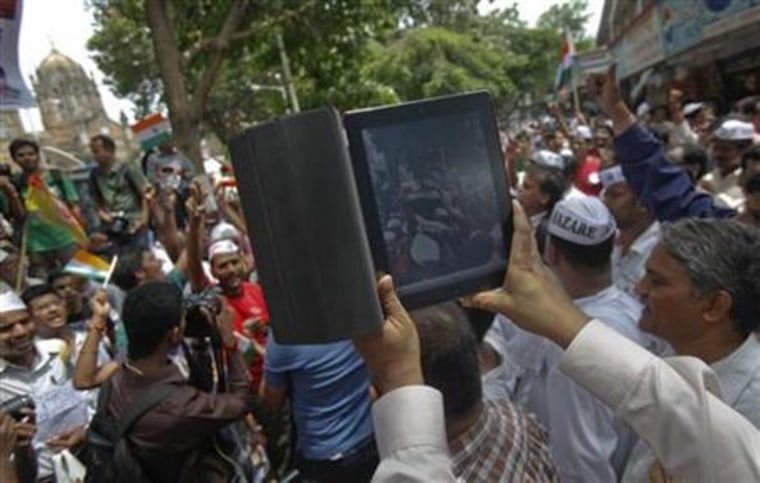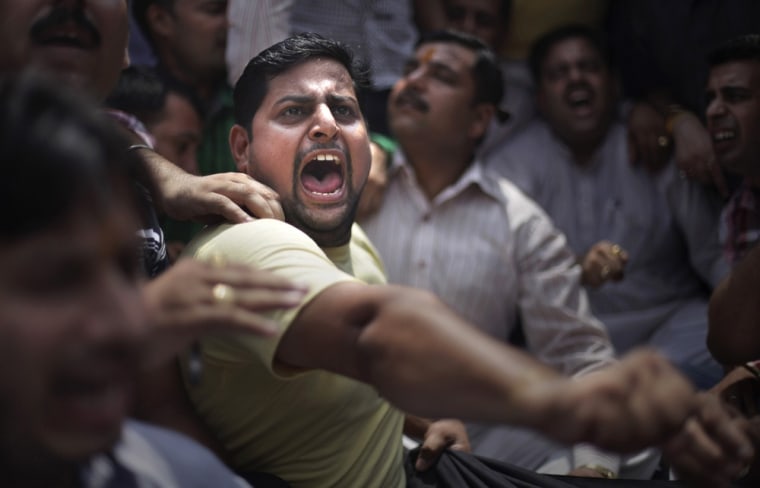Protests swelled across India on Wednesday in support of a self-styled Gandhian anti-corruption campaigner in jail on a hunger strike, with Prime Minister Manmohan Singh's struggling government at a loss over how to end the standoff.
Singh, 78, dismissed the fast by Anna Hazare as "totally misconceived." His comments sparked outrage as lawmakers cried "shame."
"It is a wake-up call for all of us unless we put our house in order. The people of this country are becoming restless," said Arun Jaitley, a leader of the opposition Hindu nationalist Bharatiya Janata Party.
The squat and slight 74-year-old Hazare fasted as thousands of his followers gathered outside the jail, the latest development in a crisis that saw him arrested Tuesday and then refuse to leave jail after the government ordered his release.
Spurred by messages on social networking sites, such as on Twitter and Facebook, at least 15,000 thronged to one protest site in central Delhi alone, a Reuters reporter said.
"The government really doesn't know what it is doing," said Kuldip Nayar, a veteran political analyst. "It is bungling, mishandling. They do not know at all how wide and how deep the resentment is."
Hazare, who has struck a nerve with millions of Indians by demanding tougher laws against rampant corruption, had insisted he wants the right to return to a city park where he had originally planned to publicly fast, before he leaves jail.
The arrest and sudden about-turn to release him appeared to confirm a widespread feeling Singh's government is cornered, clumsy and too riddled with scandal to govern Asia's third-largest economy effectively.
A weak political opposition means that the government should still survive the crisis, but it could further dim the prospect for economic reforms that have already been held back by policy paralysis and a raft of corruption scandals.
'I am Anna'
"We don't have faith in our government," said Sujeet, a young software engineer from the IT city of Gurgaon, as he protested at tourist site of India Gate in the capital. "We are living in a democracy but only in letter, not in spirit."
Many of the crowd were young, with rucksacks on their backs, some with their faces painted. Others were older, decked out in outfits as worn by the bespectacled Hazare, with his trademark white cap and kurta, a long-time social activist who is often compared to independence leader Mahatma Gandhi.

In northeast Assam state, thousands of farmers, students and lawyers marched. In the financial capital of Mumbai, thousands of people carrying the Indian flag and wearing Gandhi caps chanted "I am Anna."
"I was forced to pay a bribe while getting my passport approved and I felt helpless," said student Rahul Acharya, 21. "This is the time all youngsters should join the movement so that the future would be corruption-free."
In the IT hub of Hyderabad, lawyers boycotted courts, students skipped class and hundreds took to the streets.
Across southern Andhra Pradesh state, a Congress party stronghold, thousands went on snap fasts, staged sit-ins, blocked roads and formed human chains.
Demonstrations are part of daily life in the towns and cities of India, a country of 1.2 billion people made up of a myriad of castes, religions and classes. But spontaneous and widespread protests are rare and the scale of this week's outpouring of public fury has taken the government by surprise.
Generation gap
Hazare became the unlikely thorn in the side of the Congress-led coalition when he went on hunger strike in April. He called off that fast after the government promised to introduce a bill creating an anti-corruption ombudsman.
The legislation was presented in early August, but activists slammed the draft version as toothless because the prime minister and judges were exempt from probes.
A stone-faced Singh was uncompromising, but offered little vision in a speech to parliament.
"I acknowledge that Anna Hazare may be inspired by high ideals," a stern-looking Singh said. "However, the path that he has chosen to impose a draft of the bill on parliament is totally misconceived and fraught with grave consequences for our parliamentary democracy.

"We must not create an environment in which our economic progress is hijacked by internal dissention."
Critics say Singh's government of mainly elderly politicians has no idea how to react to spontaneous protests, highlighting a generation gap as social networks galvanize thousands, including many of India's growing urban middle class, from Supreme Court lawyers to students.
The Congress party held an emergency meeting to discuss the crisis. But the absence of party chief Sonia Gandhi due to an undisclosed illness appeared to have further weakened the government decision-making.
Gandhi left control of the party in the hands of a quartet, including her 41-year-old son, Rahul, widely seen as a prime minister in waiting.
India's Arab Spring?
The anti-corruption movement led Hazare is snowballing into one of the biggest challenges in decades and if not contained risks sparking India's own version of an Arab Spring revolt.
While no one is expecting an Egypt-like overthrow in the world's biggest democracy, a galvanized and frustrated middle class and the mushrooming of social networking sites combined with an aggressive private media may be transforming India's political landscape.
Hazare has quickly become a 21st century Mahatma Gandhi inspiration for millions of Indians fed up with rampant corruption, red tape and inadequate services provided by the state despite the country posting near-double digit economic growth for almost a decade.
With costs of living rising fast and daily news reports of state officials with meager salaries caught with bags of cash and kilograms of gold, or registered as owners of multi-million-dollar homes, patience seems to have been snapped.
"When people exhaust their capacity for tolerance, then you should take it that it is a beginning of some kind of revolution. Now it has gone above people's tolerance level," Hazare told Reuters in a recent interview in his home village.
India ranked 87 in Transparency International's index on corruption in 2010, behind rival China. Polls show corruption vies with the high cost of living as the number one voter issue.
The scandals, including a telecoms bribery scam that may have cost the government $39 billion, have dented investor confidence and distracted parliament just as the $1.6 trillion economy is being hit by inflation and higher interest rates.
The young and old, rich and poor, without apparent political affiliations, have taken to the streets in a rare voice of solidarity — a potential lethal cocktail for any party in power in India.
